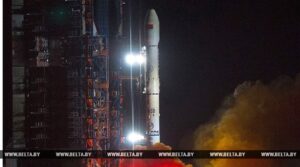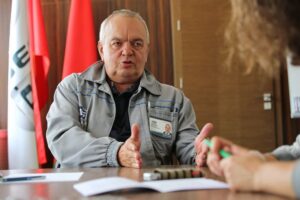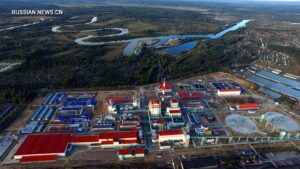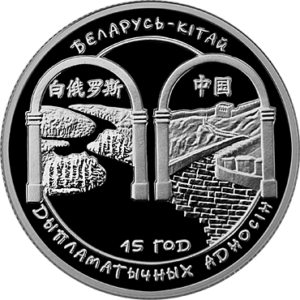Can Russia compensate Belarus losses from Western sanctions?

On 12–13 April 2022, Alexander Lukashenka paid a working visit to Russia’s Far East. This was his third trip to the neighbouring country this year. According to Russian media, talks taking place between Lukashenka and Russian President Vladimir Putin unexpectedly transformed into a substantive discussion around sanctions. As fresh statistics and new deals show, to withstand Western pressure, the Belarusian regime, far from collapsing, increasingly relies on Moscow. But it results in undermining Belarusian statehood and making the country pliable to Putin’s demands in his war with Ukraine.
Rapid rise in Belarus-Russia trade
Speaking during his recent visit Lukashenka said, “I am glad that these sanctions were imposed on us. Finally, we have begun to cooperate with Russia in the way we should have been cooperating for a long time.” Slightly earlier, at a 9 April Belarusian Security Council meeting, Lukashenka set forth his general vision by saying, “With the departure of Western companies from the markets of the Union State of Belarus and Russia, large niches have been vacated that we need to fill.”
Isolation from the West after August 2020 had already led Belarus to refocus on Russia. Trade between Belarus and Russia in 2021 exceeded $40bn (135 per cent in comparison with 2020). That is a remarkable figure because analysts predicted just 10 per cent growth, to $34bn of annual trade volume, after economic data for the first half-year were published.

Belarusian foreign trade in goods (blue—total, red—export, green—import). Image: Belarusian Ministry of Foreign Affairs.
Last year, state statistics committee Belstat stopped publishing many statistics on exports and imports. But it is safe to assume growth has been driven by the consequences of increasing Western sanctions. Media also reported of Belarusian firms responding to Western sanctions by turning to Russia. For example, BelAZ exchanged the US engines on its trucks for Russian ones.
Trade with Russia will keep growing this year. Harsher Western sanctions on Belarus and the collapse of trade with Ukraine (Belarus’ second-largest economic partner) have produced knock-on effects. Minsk has lost commercial opportunities in multiple areas. At the same time, there are new opportunities in Russian markets due to the rupture in commercial links between Russia and the West.
The Belarusian government hopes to benefit from the increasing access of Belarusian firms to Russian public procurement. In May, Russia’s Finance Ministry will initiate proceedings to empower five Belarusian banks to issue guarantees for suppliers willing to participate in Russian government procurements. This will simplify participation in Russian state orders for Belarusian suppliers. During the recent Far-East visit, Lukashenka lobbied for Belarusian participation in the construction of Russia’s new spaceport near Blagoveshchensk. The purpose of the spaceport is to diminish Moscow’s dependence on the former Soviet Baikonur Cosmodrome in Kazakhstan.
Energy problems
More important news was announced after the Lukashenka-Putin summit. An agreement is in the works between Russia and Belarus to set up a single electricity market, which would launch in 2024. Such an agreement will help Minsk to export excess electricity from Belarus’ nuclear power plant—built with a Russian loan—to Russia.
After investing heavily in energy, Minsk found itself in dire straits when meaningful economic ties with all neighbouring countries except Russia became disrupted. Belarus itself does not need additional energy. The country in 2020, even without a working nuclear power plant (NPP), had an energy surplus: generation amounted to 38.68bn kWh, with a consumption of 33.2bn kWh, and a relatively stable internal demand for electricity.

Astraviets nuclear power plant. Image: zviazda.by.
Minsk built an NPP for two reasons. First, it sought to reduce dependence on Russian gas. Throughout the 2010s, Minsk quarrelled with Gazprom. The second reason it built an NPP was to export energy. Lithuania has opposed the project from the very beginning. The first 1.2 GW nuclear power unit of the Russian-built NPP in Belarus was put into commercial operation in July 2021, and the second will go online by the end of 2022. But in recent months all prospects for export in the foreseeable future have evaporated.
Minimal export opportunities
Another important point discussed at the Putin-Lukashenka talks involves oil deals: Russia announced its willingness to support Belarusian refineries. They are the most advanced in the region but have suddenly lost their regional market access.
Although Minsk signed contracts with Russian oil suppliers for 2022 on better terms than in previous years, the EU in June 2021 introduced sanctions against Belarusian oil and chemical exports. Belarusian petrochemical products cannot be exported via traditional routes. Anticipating troubles, the Belarusian government planned only 12.5m tons of crude oil would be refined this year. To compare, Belarusian refineries usually refine about 17–18m tons a year.
What helps the Belarusian authorities to keep the country running is getting gas from Russia at a fixed price of $128.5 per 1,000 cubic metres, which is a fraction of world market prices. Presidential Administration Deputy Head and former Economy Minister Dzmitry Krutoy earlier commented that Belarus considers gas agreements with Russia as a resource to compensate for losses incurred by sanctions and as a source of competitive advantage.

Dzmitry Krutoy. Image: BelTA.
A history of troubled relations
Good relations between Minsk and Moscow are not taken for granted, and the Belarusian leadership is perfectly aware of this. When asked in jest whether Lukashenka himself would like to journey into outer space, he responded in kind, “I would like to! I used to think that my older brother might send me there and never bring me back. Now, I don’t think so anymore.”
Lukashenka’s reply alludes to the complicated history between Minsk and Moscow. For example, on 13 January, President Putin held an open, friendly meeting with Dmitri Mazepin, owner of Uralkhim, a major potash producer and the key competitor of Belarus’ potash company Belaruskali. Recent allegations were made that Uralkhim had financed political projects aimed at toppling Lukashenka. Russian newspaper Kommersant reported, “We can safely assume that Uralkhim owner [Dmitri Mazepin] financed the Belarusian opposition with the blessing of the Russian president.”
The new political economy of the Belarusian regime—with Belarus’ external economic relations being either limited to Russia or done through Russia—has been a predictable consequence of the 2020 post-election crisis in Belarus and the deterioration between Belarus and the West that followed. The government can preserve the current political situation in Belarus for as long as Putin backs it because of severed ties with all but Russia. That, obviously, harms the development prospects of a nation that can tap on Russian resources but has been largely cut off from the rest of the world.




 Later, in October 2018, the second satellite, constructed by Belarus State University for research purposes, was also launched into space with Chinese help. On 31 August 2020, Lukashenka signed an executive order concerning the launch of the second satellite, to be constructed by Belarus State University in 2021. Although no details concerning the launch have been published, most probably it will be done with Chinese help too.
Later, in October 2018, the second satellite, constructed by Belarus State University for research purposes, was also launched into space with Chinese help. On 31 August 2020, Lukashenka signed an executive order concerning the launch of the second satellite, to be constructed by Belarus State University in 2021. Although no details concerning the launch have been published, most probably it will be done with Chinese help too.


